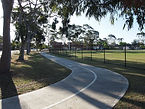

PROFESSIONAL
Development.
Our training courses and workshops are designed to provide opportunities to continue your professional development and support the growth and advancement of your career.
Courses are available to everyone
We welcome training requests
Our courses can be arranged privately and delivered directly to your council or organisation

Erosion and Sediment Control Level 2
The Erosion and Sediment Control Level 2 course will provide participants with the knowledge and skills to assess, identify and comply with requirements related to managing Erosion and Sediment Control (ESC) on their worksites.
This course is delivered in partnership with Terry Clark of Topo.
The content of this course is based on the “Best Practice Erosion and Sediment Control” (IECA, 2008) and subsequent updates, as well as referencing other applicable industry documents. Attendees will gain practical knowledge on current best practice requirements, compliance requirements along with an appreciation of how to manage the risk to both the environment and the project.
Attendees are not required to have completed the Level 1 course prior to enrolling for the Level 2 course.

Insurance, Indemnities and Managing Risk Allocation in Commercial Contracts
McCullough Robertson’s Insurance and Corporate Risk Partner, Stephen White, and Special Counsel, James Lynagh, will give an insightful overview on insurance, indemnities, and risk allocation for construction and infrastructure projects in local government.

Road Safety Audit Workshop
Road Safety Audits are an integral part of the safe system approach at all stages of the road construction and maintenance process. The objective of a road safety audit is to identify foreseeable hazards for all road users.
The road safety audit process provides a reasonable, but not absolute, hazard identification method for all road users, focusing on reducing fatal and serious injuries.

Unsealed Roads Workshop | Cairns
Practical information and guidance that will help you review your unsealed roads practices and ensure you are achieving value for money for road users.
The 2-day Unsealed Roads Workshop provides attendees with practical information and guidance on the use of materials, maintenance practices, and management of unsealed roads. Much of the content is based on ARRB’s 2020 Unsealed Roads - Best Practice Guide, and Austroads’ Guide to Pavement Technology Part 6 – Unsealed Pavements, 2009. In addition to these key reference documents, practical knowledge and real-life examples from road authorities are provided.
IPWEA-QNT is offering a two-day workshop to provide support for road authorities and private industry.

Temporary Traffic Management
Temporary Traffic Management Practice for Managers, Supervisors and Project Managers
Temporary Traffic Management (TTM) represents one of the highest WHS risks to Road Infrastructure Managers (RIM) due to the volume of activities that occur on and near roads and the serious outcomes that may arise in the event of a traffic incident. Asset owners must have a clear understanding of the associated risks and develop the policies, procedures, guidance, and systems that ensure that best practice TTM is implemented as practicable.
This one-day workshop will provide a practical overview of the new standards, the key changes in TTM practice, and other key elements that must be applied to achieve compliance.

Concrete Pathway/Cycleway Design & Construction
Concrete pathways and cycleways are an important and integral consideration in the planning and design of subdivisions, roads, open spaces and other environments where people and active transport devices need to travel. There are a variety of design aspects that must be considered to provide appropriate, long-lasting and economical concrete paths irrespective of location, size, cost or complexity.
IPWEA-QNT, in collaboration with Danley, we are pleased to offer a workshop on Concrete Pathway Design ‘based on relevant industry guidelines and standards.
The course will provide designers and practitioners with information to appropriately design, construct and maintain concrete pathways and cycleways, through the knowledge and guidance provided by experienced industry design professionals.

Erosion and Sediment Control Level 3
The Erosion & Sediment Control Level 3 course will provide attendees with the opportunity to improve their decision-making process with regards to erosion and sediment management at all stages of the project from planning, design, implementation and finally through to completion.
This course is delivered in partnership with Terry Clark of Topo.
This course is identified as advanced training with attendee numbers limited to provide the best learning environment, encouraging discussion and engagement. It is not a prerequisite for attendees to have completed the Level 1 & 2 courses, however attendees should have a existing understanding and experience with Erosion and Sediment Control (ESC). Registration for the Level 3 course includes attendance of the Type A, B & D sediment basin design course (day 3).
Attendees will gain knowledge and skills to develop and/or assess an ESC plan against the requirements of the IECA 2008 “Best Practice Erosion and Sediment Control” document and its revised appendices..


